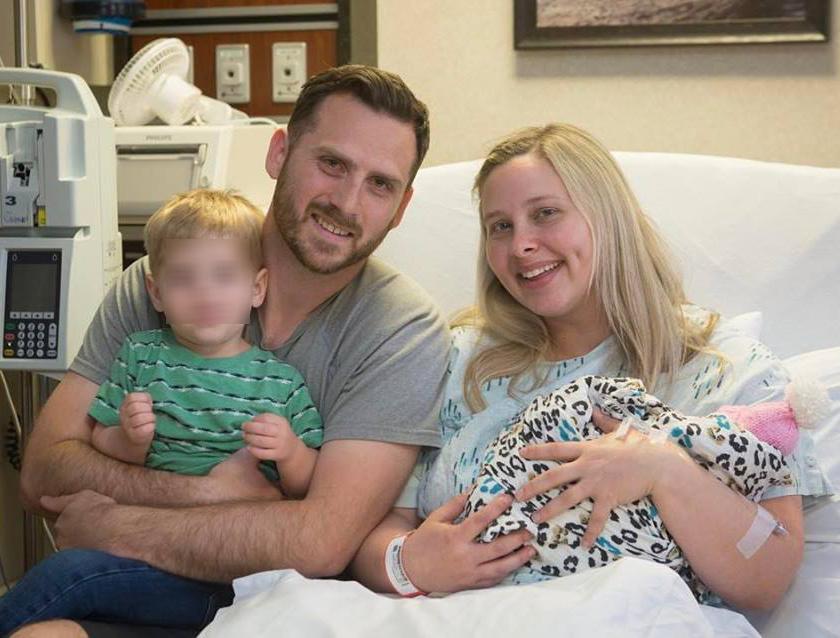Woman gives birth to terminally ill baby to donate its organs
Eva Grace Young died of the birth defect anencephaly on the day she was born

Your support helps us to tell the story
From reproductive rights to climate change to Big Tech, The Independent is on the ground when the story is developing. Whether it's investigating the financials of Elon Musk's pro-Trump PAC or producing our latest documentary, 'The A Word', which shines a light on the American women fighting for reproductive rights, we know how important it is to parse out the facts from the messaging.
At such a critical moment in US history, we need reporters on the ground. Your donation allows us to keep sending journalists to speak to both sides of the story.
The Independent is trusted by Americans across the entire political spectrum. And unlike many other quality news outlets, we choose not to lock Americans out of our reporting and analysis with paywalls. We believe quality journalism should be available to everyone, paid for by those who can afford it.
Your support makes all the difference.An American woman who decided to carry her terminally-ill baby to full term so she could donate the little girl's organs has given birth.
Keri Young, from Oklahoma, posted a picture of herself, her husband Royce and their son Harrison with their newborn daughter Eva Grace on social media on Tuesday.
“We said hello and goodbye to our sweet Eva yesterday. She was so perfect in her own little way,” Ms Young wrote.
The couple found out their baby had fatal anencephaly when they went for an ultrasound scan at 19 weeks.
“She has perfect feet and perfect hands. She has perfect kidneys, perfect lungs and a perfect liver. Sadly, she doesn't have a perfect brain,” Ms Young wrote on Facebook at the time.
“We found out recently she has anencephaly and is terminal.”
The birth defect, in which the baby is born without a fully developed brain, is typically fatal within hours of birth.
But instead of inducing an early labour, the couple decided to continue the pregnancy so their daughter's organs could be donated and "give life to multiple people".
Eva was due on 7 May, but is believed to have been born around three-weeks premature, following some complications.
Earlier this month, Ms Young posted an image on Facebook with a pregnant friend to illustrate how she was retaining more fluid than normal; because of her anencephaly, Ms Young explained, Eva was unable to practice swallowing amniotic fluid, which is usual for foetuses, causing it to build up.
In March, Ms Young had been concerned she might lose the pregnancy because of her fluid levels.
She wrote on Facebook: “The longer I stay pregnant, the higher the chance is we will get to spend time with Eva before she passes (theoretically) so we're taking things easy and doing our part in that."
She added: “Organ donation for transplant is no guarantee for her and we knew that from the beginning but I won't lie, we want her to continue living in some way. We're trying to come to grips with all our possibilities right now and be okay with whatever happens because there are no givens with anencephaly.”
Organ donation from newborns is rare, but possible. In the US between 2008 and 2013, 21 organ donors were a week old or less, according to the United Network for Organ Sharing.
In the UK, where guidelines about brain activity make it extremely difficult for doctors to take organs from babies less than two months old before they begin to deteriorate, the first ever organ donation from a newborn baby happened in 2015.
Doctors told the Youngs that if everything went to plan Eva's heart valves would be eligible for donation, along with her kidneys, liver and possibly pancreas.
They were also told they could donate her lungs for research.
The couple are yet to announce if it was possible to donate any of Eva's organs.
They explained why they opted to carry the baby to term when they first found out she would not survive, with Ms Young posting on Facebook at the time: “Faced with terrible options we have decided to continue the pregnancy to full term so Eva, which literally means life, can grow strong and give life to multiple people through organ donation.
“Eva will have life even though it will be short. She'll donate anything she can and do more in her time on earth than I ever will.”
Join our commenting forum
Join thought-provoking conversations, follow other Independent readers and see their replies
Comments